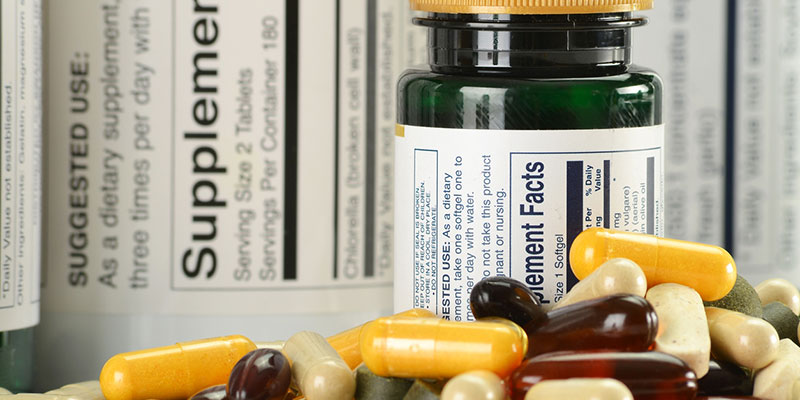Which Supplements Should You Take for Healthy Skin?
We now understand more clearly how what you put into your body has an impact–whether good or bad–on the appearance of your skin. So while limiting foods like soda, candy, white bread, and fried foods can help to improve your skin’s health and appearance, it is equally important to know which nutrients to include more abundantly in your diet to optimize your skin health. Here are six supplements that can give your skin (and body) a boost.
Antioxidants
Many of the visible signs of aging in our skin are related to oxidative stress. Factors like sun exposure, air pollution, and the process of glycation stress the body at the cellular level, so the resulting damage is only seen over time. Antioxidants help to neutralize this damaging oxidation of free radicals, thereby preventing damage from developing. While there are topical antioxidant serums, such as SkinCeuticals C E Ferulic and Nivea Skin Firming with CQ10, the best approach to getting enough antioxidants is to combine great topical products with dietary antioxidants. You can add vitamin C and coenzyme Q10 supplements to your daily routine to give your skin a boost of free radical protection. Further, adding vitamin E supplements to these antioxidants can help to increase their effectiveness (Dermatology Times).
Arnica
Arnica is an herbal supplement that is often used to treat swelling and bruising and aid in the wound healing process (University of Maryland). Because of this, the primary use of arnica in skincare is preceding injections of facial fillers or neuromodulators to help minimize bruising afterward. Talk with your dermatologist or skilled injector before starting any new medications or supplements before your appointment. That said, taking an arnica supplement like Arnika Forte a week or two before your injection treatments is recommended.
Biotin
Although biotin is a B vitamin, it is sometimes referred to as “vitamin H,” derived from the German words haar and haut, meaning “hair” and “skin.” As its nickname suggests, biotin is an excellent supplement to help strengthen your hair and nails and improve the look and feel of your skin (University of Maryland). Taking just 2.5mg of biotin each day can improve the thickness of your nails by 25 percent.
Glucosamine
Glucosamine is an amino sugar that is often used to alleviate joint pain. This is because it is able to stimulate the production of hyaluronic acid, which acts as a lubricant for your joints (BMC Musculoskeletal Disorders). Hyaluronic acid is also a major component of your skin, where it binds to and retains large quantities of water, adding suppleness to the skin’s structure. Thus, it is highly likely that glucosamine can increase the amount of hyaluronic acid present in your skin as well as your joints, resulting in a smoother, more hydrated, and more youthful appearance. If you’re over the age of 35, you might do best taking 1500mg of glucosamine daily to help diminish fine lines and wrinkles.
Omega-3 Fatty Acids
Omega-3 fatty acids are natural components of the skin’s protective barrier. They also have hydrating and anti-inflammatory properties, making them great supplements and topical ingredients for many people struggling with chronic conditions like eczema, psoriasis, or rosacea. You can obtain omega-3 fatty acids from food sources like salmon, flaxseed oil, chia seeds, and walnuts, but you can also take a supplement of around 1000mg per day. These are nutrients that your body can never have too much of, so feel free to add them to your regular routine in any way that you can.
Vitamin D
Vitamin D is the subject of the debate about whether or not you should expose your skin to the sun in order to obtain it. Sun exposure is essential to a natural pathway of producing vitamin D, but you have to weigh the risks of sun exposure versus the rewards. Truthfully, you can easily get the recommended daily value of vitamin D by taking a daily supplement, so it is much safer to keep your skin protected from UV light. You can also choose foods that are fortified with vitamin D to ensure that you’re getting enough. Although uncommon, it is possible to get too much vitamin D, so talk with your doctor before starting a new supplement (Mayo Clinic).
Dr. Leslie Baumann, M.D. and her team at Baumann Cosmetic Dermatology believe in proof, not promises. World-recognized for both cosmetic and general dermatology, our treatment strategies rely exclusively on evidence-based, scientifically verified products and procedures that promote skin health and a natural appearance. We combine effective medical procedures with individualized instruction on proper skincare, nutrition, supplementation and lifestyle in order to maximize the health of the skin and body as a whole while minimizing the effects of aging. For more, visit Dr. Baumann’s blog for daily updates Monday through Friday, or inquire about an appointment through Derm.net.



